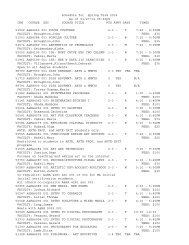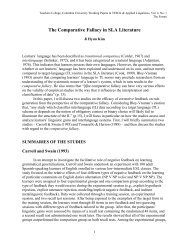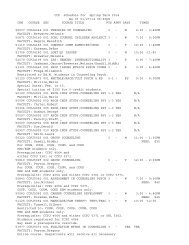UNICEF Mongolia - Teachers College Columbia University
UNICEF Mongolia - Teachers College Columbia University
UNICEF Mongolia - Teachers College Columbia University
You also want an ePaper? Increase the reach of your titles
YUMPU automatically turns print PDFs into web optimized ePapers that Google loves.
CHAPTER 5: TOTAL PAY OF TEACHERS AND THE BONUS SYSTEM<br />
1<br />
2<br />
3<br />
4<br />
5<br />
6<br />
flawed and deserves a thorough revision. It is a system that has developed over me and now includes<br />
components and aspects that are incongruent with each other. Over the past two decades, the bonus<br />
system for outcomes-based contracts and quarterly performance payments was merely added to a<br />
system that already operated with skills bonuses. This is an example of addive school reform in which<br />
new pracces and regulaons are merely added to exisng ones without replacing, or phasing out,<br />
previous regulaons.<br />
Each bonus system is problemac in itself for a different reason:<br />
• The bonuses for Olympiads and compeons reward teachers for focusing on high-performing<br />
students.<br />
• The bonuses for outcomes-based contracts enrely rely on funds generated at the school level<br />
and thus generate inequalies between large (resource-rich) schools and small (resource-poor)<br />
schools.<br />
• The bonuses for quarterly performance are financed from the centrally allocated salary fund<br />
but, in effect, funcon as a 13 th monthly salary in that the bonus is given indiscriminately to<br />
almost every teacher at the school, thus undermining the purpose of the bonus.<br />
TEACHERS IN MONGOLIA: AN EMPIRICAL STUDY ON RECRUITMENT INTO TEACHING,<br />
PROFESSIONAL DEVELOPMENT, AND RETENTION OF TEACHERS<br />
The following Table 18 presents the main features of the three bonuses and also summarizes the empirical<br />
findings from the study with regard to the actual beneficiaries. The column on actual beneficiaries lists<br />
the percentage of teachers who received the bonus in the past quarter or in the past year, respecvely,<br />
in the 28 examined schools of this study.<br />
From the perspecve of educaon managers, there is considerable overlap in the evaluaon criteria<br />
for the outcomes-based contract and the quarterly performance payments. Even though both bonus<br />
types require significant paper work from the educaon managers, they are ulmately vague, and<br />
the evaluaons come across as arbitrary. As a result, educaon managers do not dare to make harsh<br />
judgments on teachers’ performance for fear of being cricized for being biased and corrupt. There is<br />
a need to reconcile or integrate the two bonuses systems of outcomes-based contracts and quarterly<br />
performance payments.<br />
In addion, there is a need to revisit the evaluaon criteria. The outcomes-contracts do comprise a<br />
formave student evaluaon component. That is, teachers are in principle rewarded for student progress<br />
over the course of the school year and are thereby encouraged to draw aenon to mentoring individual<br />
students. For a variety of reasons, however, formave student evaluaon is not strictly enforced. The<br />
outcomes-contracts are driven by self-assessment and only in rare cases is the performance of the<br />
teacher rigorously assessed externally. As a result, teachers inflate the grades of their students towards<br />
the end of the school year in order to document progress over the course of the past few months.<br />
Nevertheless, strengthening formave student evaluaon and encouraging aenon to weak students<br />
would be very much needed if schools seek to systemacally aract out-of-school children and retain<br />
them in school unl the end of compulsory educaon or beyond.<br />
86




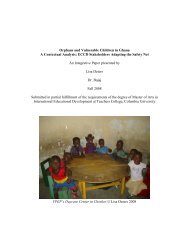
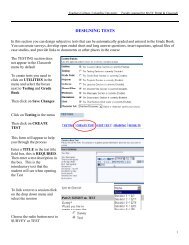
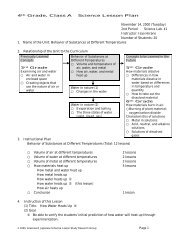

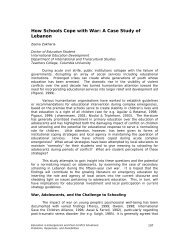




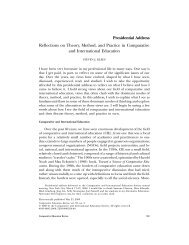
![TC Tod[...].pdf - Teachers College Columbia University](https://img.yumpu.com/27074883/1/190x252/tc-todpdf-teachers-college-columbia-university.jpg?quality=85)
